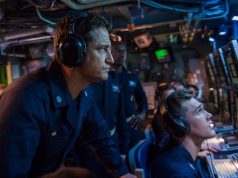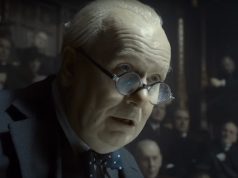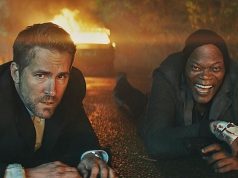As usual with apocalypses, the one in “The Book of Eli” left America covered in soot, grime, dust, and ash. We know little about what happened, only that it was 30 years ago and the survivors call it “the flash.” Actually, probably The Flash. Kind of a big deal, The Flash was.
One of the few human survivors, and indeed the only human we see for the first 10 minutes of the movie, is played by Denzel Washington, whose name we surmise is probably Eli. People he encounters call him a “walker,” because rather than settle in one of the villages, he keeps traveling on foot across the country. He’s headed West, on a mission of some kind. He holds as his prize possession a thick book with a gold cross on the cover, which we surmise is probably a Bible.
The importance of this book is one of several things that makes the film different from your standard post-apocalyptic drama (including “The Road,” which came out less than two months ago). Written by newcomer Gary Whitta and directed with graphic-novel-like flair by twin brothers Albert and Allen Hughes (“Menace II Society”) — their first film since 2001’s “From Hell” — it has the bleak, desaturated look that these things always have, and not an abundance of new ideas. But the new ideas it does have are thought-provoking and surprising, enough to make the film worth considering.
It is quickly established that, despite the threat of highwaymen, looters, and cannibals, Eli can take care of himself on the road. A hardy survivalist, he’s learned that if you roast a cat for food, the oil that drips out of it can be used as lip balm, a hint I’m fairly certain Martha Stewart never mentioned. And while he isn’t much to look at, Eli can hold his own in a fight, wielding a machete like a pro.
He stops in what looks like an Old West settlement, though it probably used to be a major boulevard in Phoenix or something. (A faded “J Crew” sign is barely visible above one of the storefronts.) Here people can trade what they have for what they need: moist towelettes, cigarette lighters, et cetera, in exchange for drinking water or food. Things are civilized here, more or less — again, the Old West is invoked — and run by a man named Carnegie (Gary Oldman), who operates a saloon/hotel/brothel and employs many henchmen and lackeys. The bulk of all the world’s reading material having been extinguished 30 years ago, Carnegie is one of the few literate men in this society, and he’s been searching for a particular book that he believes will help him gain even more power. What are the odds it’s the same book Eli has??
Solara (Mila Kunis), a young woman in Carnegie’s employ, befriends Eli for the purpose of learning more about him, and is curious about the book. Her mother, Claudia (Jennifer Beals), also somehow beholden to Carnegie, is blind. Blindness is common here, evidently because of The Flash. Outdoors, everyone wears sunglasses or goggles, and the sky is always white. This method of cinematography is frustrating in the beginning, when people appear almost as silhouettes against the bright background, but it’s toned down as the film goes on.
The story amounts to a showdown between Eli and Carnegie, one believing he’s on a mission from God, the other with more selfish motives. What I find interesting is the idea of spiritual faith being as powerful as it is to Eli. He comes across like an Old Testament prophet, willing to do whatever it takes to complete his mission, and unwavering in his dedication to it. These are not common attributes in movie heroes, so it’s intriguing to see these matters handled in what you wouldn’t peg as a “religious” film.
Washington’s performance is solid, as usual, though it’s far from the most demanding role he’s ever played. Gary Oldman’s menacing Carnegie is suitably hammy, and Tom Waits shows up as an amusingly paranoid shopkeeper. Mila Kunis and Jennifer Beals, representing the fairer sex, try to rise above the cliche that women are only victims, but it must be said that women do not fare very well in this society. Still, Solara and Claudia are each given their moments of strength.
The revelations and twists in the story’s finale, clever and satisfying though they are at the time, don’t stand up to much scrutiny: I doubt this is a movie that people will watch over and over again. But it’s shot with style, and the story has enough thrills and dark humor to justify one two-hour trip into the desolate future.
B (1 hr., 58 min.; )





